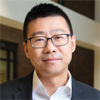Letian Dou

- Charles Davidson Associate Professor of Chemical Engineering | Materials Chemistry
- Email: dou10@purdue.edu
- Phone: 44194
- Office: 3053B FRNY
- Professor Letian Dou's individual homepage
Our mission is to use simple chemistry and physics to design materials that tackle today’s most critical energy and sustainability challenges.
1. Hybrid Electronic Materials
The design of new hybrid materials for the next generation of solar cells and optoelectronic devices and the elucidation of their fundamental structure-property-performance relationships are the key focus of the Dou research group. Specifically, we aim to assemble organic and inorganic materials together through non-covalent and covalent interactions. We tailor the properties of these materials at the nano scale and molecular level in order to deliver new fundamental insights regarding the semiconducting organic-inorganic interface. In turn, this will allow for improved performance of solar energy harvesting and solid-state lighting, and chemical/biological sensing devices. Our research is highly interdisciplinary as it bridges chemistry, chemical engineering, and materials science such that new research paradigms that cut across traditional science and engineering disciplines can be established.
Currently, we are using halide perovskites and organic semiconductors as the model system to develop new hybrid materials with unique functionality. Specifically, we define such Organic Semiconductor-incorporated Perovskite as“OSiP“, an emerging family of hybrid material with many unprecedented properties.
List of active projects:
- Chemistry and physics of two-dimensional OSiP: synthesis, heterostructures, exciton dynamics and transports (with Libai Huang group), ion transports, imaging.
- High performance perovskite- and OSiP-based solar cells, LEDs, transistors, thermoelectric, and memory devices.
- Bioelectronics and bio-sensors using intrinsically-stretchable organic and hybrid materials. (This is associated with Mi-Bio at Purdue)
These projects are supported by Office of Naval Research, Department of Energy (Office of Basic Energy Sciences and Solar Energy Technologies Office), and National Science Foundation.
2. Polymer Single Crystals and Sustainable Polymers
Plastics are ubiquitous in many facets of our lives, and the plastics industry is the third-largest manufacturing sector in the United States. But as plastics production develops rapidly, the long-term environmental challenges are globally recognized. Chemically resistant plastic products have extremely long lifetimes before completely decomposing — a single-use coffee pod can last 500 years in a landfill. Plastic waste accumulation has led to pollution that affects land, waterways and oceans; organisms are being harmed by entanglement or ingestion.
Closed-loop circular utilization of plastics is of manifold significance, yet energy-intensive and poorly selective scission of the ubiquitous carbon-carbon (C-C) bonds in contemporary commercial polymers pose tremendous challenges to envisioned recycling and upcycling scenarios. Our group focuses on a unique topochemical approach for creating elongated C-C bonds with a bond length of 1.57~1.63 Å (in contrast to conventional bonds with a C-C bond length of ~1.54 Å) between repeating units in the solid state with decreased bond dissociation energies. These polymers with elongated and weakened C-C bonds exhibit rapid depolymerization within a desirable temperature range (e.g., 140~260 °C), while otherwise remaining remarkably stable under harsh conditions.
Active research projects include:
- Synthesis of novel polymer single crystals via topochemical approach
- Synthesis of polymers with elongated and weakened C-C bonds for circular utilization
- Processing, characterization, and practical application of chemically recyclable (depolymerizable) polymer single crystals and polyolefin materials.
Education
- B.S. in Chemistry, Peking University, Beijing, P. R. China, 2005-2009
- Ph.D. in Materials Science and Engineering, University of California, Los Angeles, 2009-2014
- Chemist Postdoc Fellow, University of California, Berkeley, 2014-2017